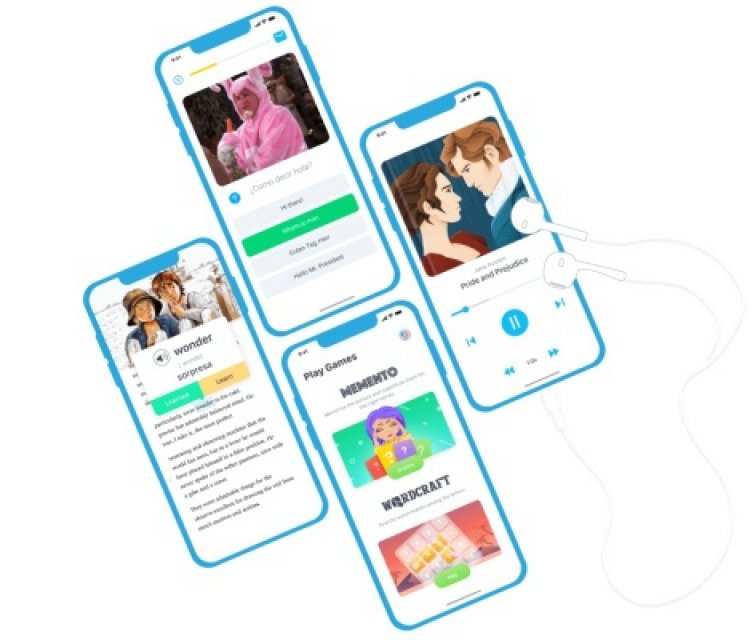EWA, which taps into popular media to teach languages, hits 51M downloads and 3.5M MAUs and raises its first outside funding
Online language learning continues to be a huge opportunity for startups, with the most engaging experiences meeting a surge of interest from consumers looking for more productivity out of the hours that they spend on their smartphones. In one of the more recent developments, a language learning app called EWA — which has built a […]

Online language learning continues to be a huge opportunity for startups, with the most engaging experiences meeting a surge of interest from consumers looking for more productivity out of the hours that they spend on their smartphones. In one of the more recent developments, a language learning app called EWA — which has built a media-based approach to language acquisition, with excerpts from films and TV, and books, to familiarize learners with vocabulary and speaking — has passed 51 million downloads and picked up 3.5 million monthly active users, and now it has raised $2.7 million in its first outside funding.
EWA — pronounced “E-vah”, says co-founder and CEO Max Korneev — has been bootstrapped since being founded in 2018, and it’s been doing well on its own steam, with a current annual revenue run rate of $32.4 million, based on charging people along three tiers of usage. (The “freemium” part of the app is a three-day trial, but it also has an extensive presence on other social media channels like TikTok and Instagram, where it is essentially a content creator, with collectively millions of users learning languages informally from its posts. EWA English alone has more than 5 million followers.)
Korneev said the startup is now turning to outside funding now both to meet the growth demands it’s now facing as it scales, and also to hire more engineers to build out features that it has long wanted to have in the app, including more social elements, gamification hooks, and a wider set of languages, with the current list spanning English, Spanish, French, German and Italian.
The seed round includes participation from Day One Ventures, Elysium and angels, founders and executives from Semrush, Zynga, Niantic and Zynga. And from what we understand, EWA is already working on its Series A, a $30 million round that it will be raising at a $150 million valuation, with Softbank among the VCs talking to the startup. (I’ve reached out to Softbank for comment; Korneev declined to comment.)
Duolingo, which is now publicly traded with a market cap today of about $3.4 billion, has stolen a march on the online language learning market in part by making its app very sticky: users log in daily to keep learning streaks going and to stay at the top of their leagues, and they link up with people on the app that they might also know in the real world, tapping into natural competitiveness and turning that into habitual behavior.
EWA’s unique selling point up to now has been how it has harnessed the vast world of online media in aid of its purpose. Users of the app have options to learn by reading well-known books, or excerpts from popular films and TV — the idea being that their familiarity with plot lines will give them a head start in making out what people are saying. It then bolsters that knowledge with word games.
The approach appealed to me personally because it reminded me of how my family and I learned English when we first came to the U.S. from Russia. (And no, the coincidence that Korneev is also Russian was not lost on me.) Korneev said that this was an intentional choice the company made to try something different and more attuned to our modern times to bring in a different kind of language learner.
“If you look at the self-education apps space, a lot of them copy the dynamics of a classroom, and more specifically old methologies, but these are just not effective anymore,” he said, pointing out that Duolingo’s own research has found that on average less than 1% of people ever finish an online language course. “People want to be entertained. So when we ask our users, why do you use EWA, they answer, because it’s entertaining. We combine that entertainment with education.”
It seems that my family is not the only one that took the “native media” approach to learning languages: this was also how Korneev learned different languages while working in IT.
“A lot of startups are born out of pain, and this is how EWA started, too,” he said. “I ended up watching films with subtitles and reading books with vocabulary on the side,” he said. “I saw that others were doing this, too, and it was helping them move forward with a language.” He was taken enough with the idea that he quit his job in IT to see if he could turn his own language learning approach into a business. He teamed up with other co-founders Stepan Nikitin, Anton Aleshkevich, and Stas Morozov, and thus EWA was born.
The startup has a mass of developers based out of Russia but EWA itself is officially based in Singapore — something that Korneev said was very much intentional because it’s hard at the moment (understandably) for Russian startups to raise money from western investors. Korneev, in keeping with this moment in time and the Covid pandemic that has changed how many of us work, describes the team as a remote workforce, with he himself splitting time between Singapore, Budapest and Barcelona.







